- Home
- Richard Flanagan
The Sound of One Hand Clapping
The Sound of One Hand Clapping Read online
About the book
In the winter of 1954, in a construction camp in the remote Tasmanian highlands, when Sonja Buloh was three years old and her father was drinking too much, Sonja's mother walked into a blizzard never to return.
Some thirty-five years later, when Sonja visits Tasmania and her drunkard father, the shadows of the past begin to intrude ever more forcefully into the present – changing forever his living death and her ordered life …
Since its first publication in 1997, Richard Flanagan's classic story of a migrant family has become one of the most loved literary novels in Australian history.
‘Heart-wrenching and beautifully written … A rare and remarkable achievement’ LOS ANGELES TIMES
Praise for The Sound of One Hand Clapping
‘Haunting and unforgettable.’—The Canberra Times
‘From its wonderfully atmospheric opening to its touching conclusion, this is a heartbreaking story, beautifully told.’—Literary Review
‘A story about redemptive love, a celebration of the resilience of individuals and of their power to change … deeply moving, eventually uplifting.’—The Advertiser
‘The novel that moved me to tears this year … When I read the manuscript on a plane, I had to reassure the man next to me that it was not that my life was a mess, it was just that the book was so poignant.’—Caroline Baum, The Sydney Morning Herald
‘An almost unbearably sad story … an epic tragedy conducted under the author’s microscope which requires fortitude and a man-sized box of tissues to get through … This novel is a passionately literary account of one of this country’s formative experiences.’—The Sunday Age
‘Flanagan is an accomplished ringmaster of despair and tenderness.’—The Globe and Mail
‘Flanagan makes us care about his central characters and breathes life into dark pockets of history. He underscores the terror and mystery of the landscape with a strange tenderness, a loving attention to the little rituals and memories that serve both to sustain and debilitate the people he writes about.’—The Weekend Australian
‘Magical realism, the literature of postcolonial nations, is a literature of loss, of lament for pure origins that can never be recovered, and loss is something Flanagan captures brilliantly.’—The Australian’s Review of Books
‘The Sound of One Hand Clapping is an intensely disturbing book … and yet in the moral tale played out in the novel there is some hope … the novel is haunting.’—Australian Book Review
‘Richly imagined … told in a voice rarely heard in Australia: almost violently masculine, shot through with heartbreaking delicacy of feeling.’—Robert Dessaix
‘Flanagan’s absorbing and at times deeply touching second novel seems certain to make a large mark.’—Who Weekly
‘A masterpiece of storytelling.’—Mercury
‘He has the capacity to give voice to wordless passions, primal voices that whisper and echo through memory. Tasmania reverberates throughout The Sound of One Hand Clapping like a monumental force; a character in its own right.’—The Sunday Times
‘Flanagan imbues this most Australian of stories with a middle European sensibility found in the reserve of characters in Milan Kundera’s writings … Flanagan tells an immortal story of faith and hope, its loss and rebirth … The Sound of One Hand Clapping is destined to be a classic.’—Sunday Herald Sun
Contents
Cover
About the Book
Praise for The Sound of One Hand Clapping
Title Page
Dedication
Chapter 1
1954
Chapter 2
1967
Chapter 3
1989
Chapter 4
1989
Chapter 5
1989
Chapter 6
1954
Chapter 7
1989
Chapter 8
1989
Chapter 9
1954
Chapter 10
1989
Chapter 11
1989
Chapter 12
1989
Chapter 13
1954
Chapter 14
1989
Chapter 15
1989
Chapter 16
1959
Chapter 17
1959
Chapter 18
1959
Chapter 19
1989
Chapter 20
1989
Chapter 21
1989
Chapter 22
1989
Chapter 23
1959
Chapter 24
1959
Chapter 25
1960
Chapter 26
1989
Chapter 27
1960
Chapter 28
1960
Chapter 29
1960
Chapter 30
1989
Chapter 31
1990
Chapter 32
1990
Chapter 33
1990
Chapter 34
1990
Chapter 35
1961
Chapter 36
1961
Chapter 37
1961
Chapter 38
1961
Chapter 39
1961
Chapter 40
1962
Chapter 41
1962
Chapter 42
1962
Chapter 43
1990
Chapter 44
1990
Chapter 45
1990
Chapter 46
1990
Chapter 47
1954
Chapter 48
1966
Chapter 49
1966
Chapter 50
1966
Chapter 51
1966
Chapter 52
1966
Chapter 53
1966
Chapter 54
1966
Chapter 55
1966
Chapter 56
1966
Chapter 57
1966
Chapter 58
1990
Chapter 59
1990
Chapter 60
1990
Chapter 61
1990
Chapter 62
1967
Chapter 63
1967
Chapter 64
1967
Chapter 65
1967
Chapter 66
1990
Chapter 67
1990
Chapter 68
1990
Chapter 69
1990
Chapter 70
1990
Chapter 71
1990
Chapter 72
1990
Chapter 73
1990
Chapter 74
1990
Chapter 75
1954
Chapter 76
1990
Chapter 77
1954
Chapter 78
1954
Chapter 79
1954
Chapter 80
1954
Chapter 81
1990
Chapter 82
1954
Chapter 83
1990
Chapter 84
1990
Chapter 85
Chapter 86
Also by Richard Flanagan
Death of a
River Guide
Gould’s Book of Fish
The Unknown Terrorist
Wanting
And What Do You Do, Mr Gable?
About the Author
Copyright Page
More at Random House Australia
for
Archie Flanagan
Helen Flanagan
Anton Smolej
Forgive me its failings, but I tell it with love.
Sarajevo, 1946
Here, as in Belgrade, I see in the streets a considerable number of young women whose hair is greying, or completely grey. Their faces are tormented, but still young, while the form of their bodies betrays their youth even more clearly. It seems to me that I see how the hand of this last war has passed over the heads of these frail beings…
This sight cannot be preserved for the future; these heads will soon become even greyer and disappear. That is a pity. Nothing could speak more clearly to future generations about our times than these youthful grey heads, from which the nonchalance of youth has been stolen.
Let them at least have a memorial in this little note.
Ivo Andric
Chapter 1
1954
ALL THIS YOU WILL come to understand but can never know, and all of it took place long, long ago in a world that has since perished into peat, in a forgotten winter on an island of which few have ever heard. It began in that time before snow, completely and irrevocably, covers footprints. As black clouds shroud the star and moonlit heavens, as an unshadowable darkness comes upon the whispering land.
At that precise moment around which time was to cusp, Maria Buloh’s burgundy-coloured shoes reached the third and lowest snow-powdered step outside their wooden hut. It was then, as she turned her face away from the hut, that Maria Buloh knew she had already gone too far and that she could no longer return.
Some people say she was simply blown out of the town that night with the furious blizzard winds; that the tempestuous, billowing breath of the storm picked her up and that she rose with it like an angel into the forest beyond, flew like a spectre into the wild lands that lay at every compass point beyond that place that burnt like a fresh bullet hole in flesh.
But that was not the way it was, of course.
Some people even say that she turned into the wind itself, became the gale that was to curse them all. But such terrible winds are not something one can ride as if in a dream. They can only be braced against and it was this which Maria Buloh did, for she was a sensible woman after all, despite what people say, and not a flighty woman whatsoever, and she braced against the wind as though it was a wall that might at any moment fall upon her and she pulled the scarlet coat, that tatty scarlet coat, pulled it tight around her small body. But even that gesture is getting ahead of this story, for the winds were not to blow hard until she had almost walked out of the settlement. And she had some walking to do to get that far.
‘Mama,’ Maria Buloh heard a small girl’s voice coming from inside the hut. Then once again, this time more a whimper—‘Mama…’
Maria Buloh stood there on the step, looking anywhere but at the hut behind her as she tried to soothe the child she had left within. Maria Buloh looked down at her burgundy-coloured shoes, looked at the beautiful impression such battered shoes made in new snow, saw, on the two wooden steps above where she stood, her footprints beginning to disappear in a fresh flurry of snow, and wondered at the nature of beauty, wondered at the small time allowed anything good before it was obliterated. ‘Aja, aja,’ said Maria Buloh, attempting to soothe the child with the words mothers of her country always used to put their children to sleep. ‘Aja, aja.’
As she then walked away she did not look back at the hut, but let her gaze drift upwards, let it wander beyond the rag-tag disorder of the settlement into the dark forest. Looked at the night-time blackness above. Looked at the snow falling into the cones of yellow electric light. Watched the snow circling its way earthwards. The way the white flakes eddied and whirled in the air as if they were time passing not constantly but erratically. Maria Buloh watched the way the falling snow showed that the air was never still, but held endless circling complexities, held infinite possibilities for graceful inexplicable movements.
Maria Buloh felt herself at that moment to be watching everything including herself, as if she were in a movie and this were a movie set. By thinking this way she did not hear the distant sounds of her daughter crying out to her from the hut she had just left. Strange sounds. Sounds she would not hear.
‘Mama,’ the child cried, but her mother would not hear it.
‘Aja, aja,’ Maria Buloh said soothingly, though whether the words were for her or for her child or for no reason whatsoever, nobody can know, for she was already far from their hut and the snow, in any case, deadened all sound. ‘Aja, aja.’
She continued looking: seeing it all anew, as if it had no connection with her. She saw how the whole black-and-white scene was lit up by the stark electric lights that ran up and down what passed for a street, how on either side of the street were crude vertical-board huts with corrugated-iron roofs and corrugated-iron chimneys, and how to some who lived there it brought back all too painful memories of forced labour camps in the Urals or Siberia. But she knew it wasn’t Stalin’s USSR. Knew it wasn’t Kolyma or Goli Otok or Birkenau. Knew it wasn’t even Europe. Knew it to be a snow-covered Hydro-Electric Commission construction camp called Butlers Gorge that sat like a sore in a wilderness of rainforest.
In this land of infinite space, the huts were all built cheek by jowl, as if the buildings too cowered in shivering huddles before the force and weight and silence of the unknowable, that might possibly be benign, might possibly even not care about people, but which their terrible histories—chronicles of centuries of recurring inhumanities and horrors which they carried along with a few lace doilies and curling photographs and odd habits and peculiar ways of eating—could only allow them to fear.
Because not to fear was to imagine a world beyond experience.
And that was too much for anybody.
In those cowering corrals of huts had to live the workers, for in this remote highland country of the remote island of Tasmania that lay far off the remote land of Australia, there was no other human settlement for many miles. There were just wild rivers and wilder mountain ranges and everywhere rainforest that only ceded its reign over the land to intermittent buttongrass plains, or in the higher altitudes, to alpine moorland.
That is what she saw.
What she heard was precisely nothing.
It was the time of the beginning of the great dam-building boom. The time the new Australians came to such wild places to do the wog work of dam-building because work in the cities, which the new Australians would have preferred, was Australians’ work. But Maria Buloh, wife of Bojan Buloh, mother of Sonja Buloh, wasn’t coming to Butlers Gorge.
She was leaving it.
Forever.
So Maria Buloh continued walking down the empty street, a young woman clad in an old coat carrying a small cardboard suitcase, the tracks left by her shoes momentarily bisecting that grim, sour, snow-swept camp, her image already losing its earthly outlines in the falling snow.
The sheet of silence the snow had thrown over the settlement was ripped apart by the approaching clatter of a small engine. The diffuse yellow streaks of a single small headlight made a moving piss-coloured puddle in the drifting snowflakes. Then a hunched rider on a motorbike with empty sidecar shaped out of white nothingness and bore down the street toward her. The rider sped past Maria Buloh, then fifty yards or so beyond slowed as he turned right and slewed to a halt outside the canteen. Maria Buloh stopped, turned, and stared.
In front of the canteen’s main entrance, a double wooden slat door, she saw a dozen women huddled around a fiery brazier improvised from an oil drum, preferring society under such conditions to a warmer solitude. They were clad in a quixotic motley of summer dresses and heavy winter coats, their heads cove
red with hats of varying exotic types—some berets, one slouch hat, two straw hats, a rainbow of beanies. Some women stood and some sat on the empty wooden beer barrels around the entrance, chatting and drinking beer brought out to them by their blokes—husbands and boyfriends and flirters—from the men-only canteen. When the doorway opened for a man to pass in or out, gossipy steam and steamy stories and laughter and the splintering of falling glasses spilt out over the women and onto the main street.
A leather-jacketed and helmeted figure got off the motorbike, and, conscious of making a dramatic entrance, strode past the women into the canteen. The barrel women were momentarily taken with this colourful new arrival. They heard his voice boom through the crowded canteen. ‘Name’s Eric Preston,’ he yelled. ‘I’m the AWU organiser and I’ve come to sort out the problem with the reffos. Who’s the rep here?’
But then his strident voice was lost in the babble of tongues that was the canteen drinking its past away and the interest of the women swung to the sight of the solitary woman with a suitcase walking out of the town on such a Godforsaken night to God knew where; the solitary woman who was staring at them and through them as if they were there but had never been there, as if she saw a future akin to the past when they would all once more be scattered with the wind and nothing of this horrible time and place would remain. Her face (so young, so young that it now looks shocking) seemed almost Oriental: the structure of the bones and large eyes different from those of Australians, and the lines—only a few, but deep nevertheless—seemed induced neither by the passing of the years nor by the sun, but as if they had been chiselled into her face by a sculptor to accentuate a strange, exotic beauty.
Some later said she was wrong, condemning what it was beyond them to understand. Perhaps because of this judgement, or perhaps arising from an opposite emotion, some small measure of sympathy for a tragedy that might befall any of them, or perhaps for reasons none of them would ever figure out, they nudged one another and they stopped talking when Maria Buloh looked at them so, and all that any of them or Maria Buloh could hear was the ongoing noise of the men inside.
Maria Buloh turned away. She recommenced walking out of the town. From the canteen she could hear the faint, ever fainter strains of a new American country-and-western song being played on the gramophone. The song seemed to simmer tears, like a goulash stewed out of sadness. As Maria Buloh walked toward the dark forest the babble from the canteen died away. The song became lost in the soft whip of sleet. Maria Buloh’s face was without emotion. Yes, that face—beautiful, yes; young, yes; but something else. What was it? As if fixing her mystery forever, tears—though only a few—slid from her eyes and glazed her face.
-->

 Death of a River Guide
Death of a River Guide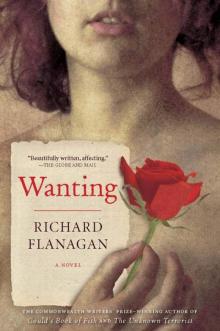 Wanting
Wanting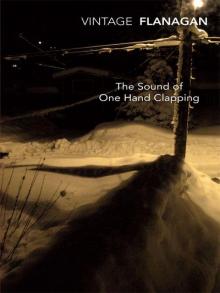 The Sound of One Hand Clapping
The Sound of One Hand Clapping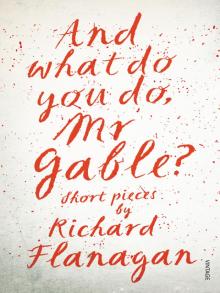 And What Do You Do Mr. Gable?
And What Do You Do Mr. Gable?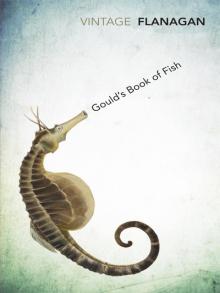 Gould's Book of Fish: A Novel in Twelve Fish
Gould's Book of Fish: A Novel in Twelve Fish First Person
First Person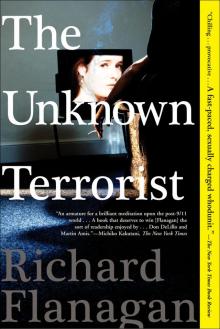 The Unknown Terrorist
The Unknown Terrorist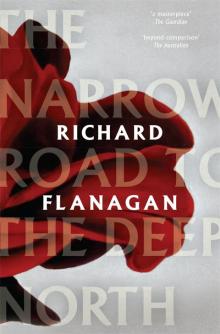 The Narrow Road to the Deep North
The Narrow Road to the Deep North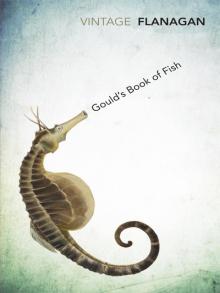 Gould's Book of Fish
Gould's Book of Fish